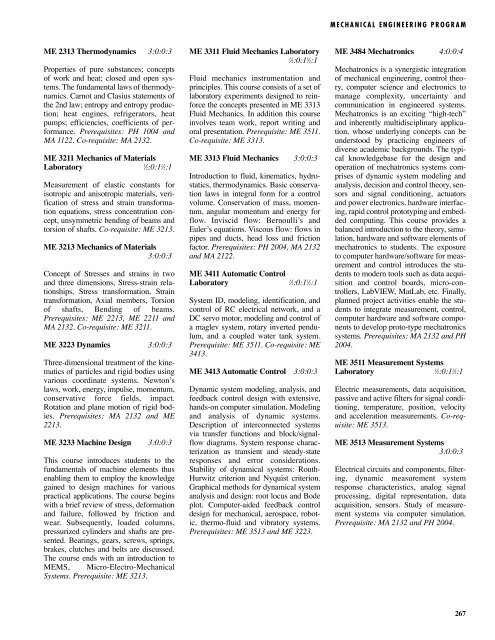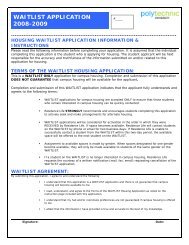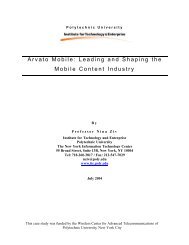POLYTECHNIC UNIVERSITY 2005-2007
POLYTECHNIC UNIVERSITY 2005-2007
POLYTECHNIC UNIVERSITY 2005-2007
You also want an ePaper? Increase the reach of your titles
YUMPU automatically turns print PDFs into web optimized ePapers that Google loves.
MECHANICAL ENGINEERING PROGRAM<br />
ME 2313 Thermodynamics 3:0:0:3<br />
Properties of pure substances; concepts<br />
of work and heat; closed and open systems.<br />
The fundamental laws of thermodynamics.<br />
Carnot and Clasius statements of<br />
the 2nd law; entropy and entropy production;<br />
heat engines, refrigerators, heat<br />
pumps; efficiencies, coefficients of performance.<br />
Prerequisites: PH 1004 and<br />
MA 1122. Co-requisite: MA 2132.<br />
ME 3211 Mechanics of Materials<br />
Laboratory 1<br />
⁄2:0:1 1 ⁄2:1<br />
Measurement of elastic constants for<br />
isotropic and anisotropic materials, verification<br />
of stress and strain transformation<br />
equations, stress concentration concept,<br />
unsymmetric bending of beams and<br />
torsion of shafts. Co-requisite: ME 3213.<br />
ME 3213 Mechanics of Materials<br />
3:0:0:3<br />
Concept of Stresses and strains in two<br />
and three dimensions, Stress-strain relationships,<br />
Stress transformation, Strain<br />
transformation, Axial members, Torsion<br />
of shafts, Bending of beams.<br />
Prerequisites: ME 2213, ME 2211 and<br />
MA 2132. Co-requisite: ME 3211.<br />
ME 3223 Dynamics 3:0:0:3<br />
Three-dimensional treatment of the kinematics<br />
of particles and rigid bodies using<br />
various coordinate systems. Newton’s<br />
laws, work, energy, impulse, momentum,<br />
conservative force fields, impact.<br />
Rotation and plane motion of rigid bodies.<br />
Prerequisites: MA 2132 and ME<br />
2213.<br />
ME 3233 Machine Design 3:0:0:3<br />
This course introduces students to the<br />
fundamentals of machine elements thus<br />
enabling them to employ the knowledge<br />
gained to design machines for various<br />
practical applications. The course begins<br />
with a brief review of stress, deformation<br />
and failure, followed by friction and<br />
wear. Subsequently, loaded columns,<br />
pressurized cylinders and shafts are presented.<br />
Bearings, gears, screws, springs,<br />
brakes, clutches and belts are discussed.<br />
The course ends with an introduction to<br />
MEMS, Micro-Electro-Mechanical<br />
Systems. Prerequisite: ME 3213.<br />
ME 3311 Fluid Mechanics Laboratory<br />
1<br />
⁄2:0:1 1 ⁄2:1<br />
Fluid mechanics instrumentation and<br />
principles. This course consists of a set of<br />
laboratory experiments designed to reinforce<br />
the concepts presented in ME 3313<br />
Fluid Mechanics. In addition this course<br />
involves team work, report writing and<br />
oral presentation. Prerequisite: ME 3511.<br />
Co-requisite: ME 3313.<br />
ME 3313 Fluid Mechanics 3:0:0:3<br />
Introduction to fluid, kinematics, hydrostatics,<br />
thermodynamics. Basic conservation<br />
laws in integral form for a control<br />
volume. Conservation of mass, momentum,<br />
angular momentum and energy for<br />
flow. Inviscid flow: Bernoulli’s and<br />
Euler’s equations. Viscous flow: flows in<br />
pipes and ducts, head loss and friction<br />
factor. Prerequisites: PH 2004, MA 2132<br />
and MA 2122.<br />
ME 3411 Automatic Control<br />
Laboratory 1<br />
⁄2:0:1 1 ⁄2:1<br />
System ID, modeling, identification, and<br />
control of RC electrical network, and a<br />
DC servo motor, modeling and control of<br />
a maglev system, rotary inverted pendulum,<br />
and a coupled water tank system.<br />
Prerequisite: ME 3511. Co-requisite: ME<br />
3413.<br />
ME 3413 Automatic Control 3:0:0:3<br />
Dynamic system modeling, analysis, and<br />
feedback control design with extensive,<br />
hands-on computer simulation. Modeling<br />
and analysis of dynamic systems.<br />
Description of interconnected systems<br />
via transfer functions and block/signalflow<br />
diagrams. System response characterization<br />
as transient and steady-state<br />
responses and error considerations.<br />
Stability of dynamical systems: Routh-<br />
Hurwitz criterion and Nyquist criterion.<br />
Graphical methods for dynamical system<br />
analysis and design: root locus and Bode<br />
plot. Computer-aided feedback control<br />
design for mechanical, aerospace, robotic,<br />
thermo-fluid and vibratory systems.<br />
Prerequisites: ME 3513 and ME 3223.<br />
ME 3484 Mechatronics 4:0:0:4<br />
Mechatronics is a synergistic integration<br />
of mechanical engineering, control theory,<br />
computer science and electronics to<br />
manage complexity, uncertainty and<br />
communication in engineered systems.<br />
Mechatronics is an exciting “high-tech”<br />
and inherently multidisciplinary application,<br />
whose underlying concepts can be<br />
understood by practicing engineers of<br />
diverse academic backgrounds. The typical<br />
knowledgebase for the design and<br />
operation of mechatronics systems comprises<br />
of dynamic system modeling and<br />
analysis, decision and control theory, sensors<br />
and signal conditioning, actuators<br />
and power electronics, hardware interfacing,<br />
rapid control prototyping and embedded<br />
computing. This course provides a<br />
balanced introduction to the theory, simulation,<br />
hardware and software elements of<br />
mechatronics to students. The exposure<br />
to computer hardware/software for measurement<br />
and control introduces the students<br />
to modern tools such as data acquisition<br />
and control boards, micro-controllers,<br />
LabVIEW, MatLab, etc. Finally,<br />
planned project activities enable the students<br />
to integrate measurement, control,<br />
computer hardware and software components<br />
to develop proto-type mechatronics<br />
systems. Prerequisites: MA 2132 and PH<br />
2004.<br />
ME 3511 Measurement Systems<br />
Laboratory 1<br />
⁄2:0:1 1 ⁄2:1<br />
Electric measurements, data acquisition,<br />
passive and active filters for signal conditioning,<br />
temperature, position, velocity<br />
and acceleration measurements. Co-requisite:<br />
ME 3513.<br />
ME 3513 Measurement Systems<br />
3:0:0:3<br />
Electrical circuits and components, filtering,<br />
dynamic measurement system<br />
response characteristics, analog signal<br />
processing, digital representation, data<br />
acquisition, sensors. Study of measurement<br />
systems via computer simulation.<br />
Prerequisite: MA 2132 and PH 2004.<br />
267




